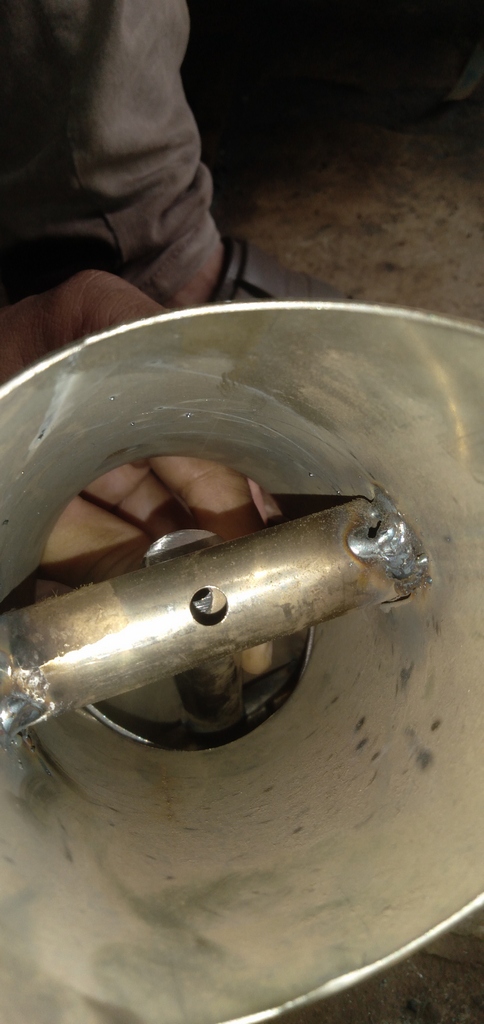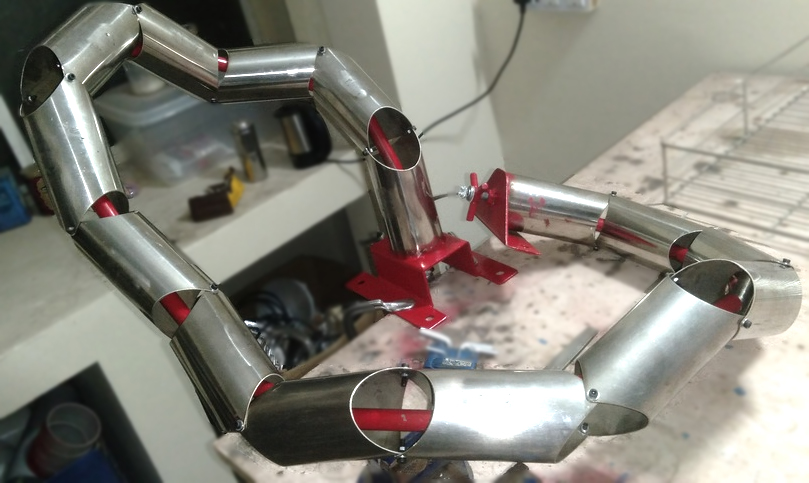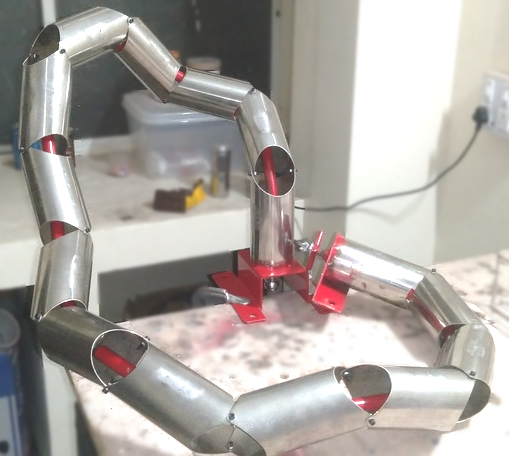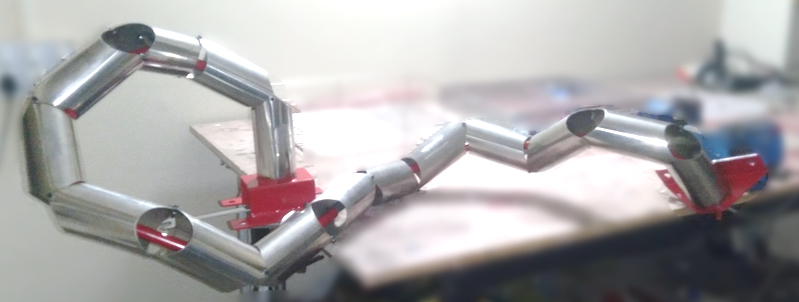- Affordable
- Locally repairable
- Locally manufacturable using intuitive tools
- Hackable by local tools
- Hackable without requiring steep and long learning curves.
- Intuitive design for easy adaptability and learning.
- Employment generating
- Skill generating
- Minimal use of exotic freshly mined resources
- Minimal dependence on non-renewable energy
- Minimal waste for whole life cycle
- Aware of how technology will affect all people and nature throughout its lifecycle.
 Author: Subir
Author: Subir
Meanwhile… the 16th Prototype failed!
From the previous post, i have been working on the idea of bistable joints. As you can see that Prototype #5 for the first testing of the idea. I have tried a few others meanwhile.
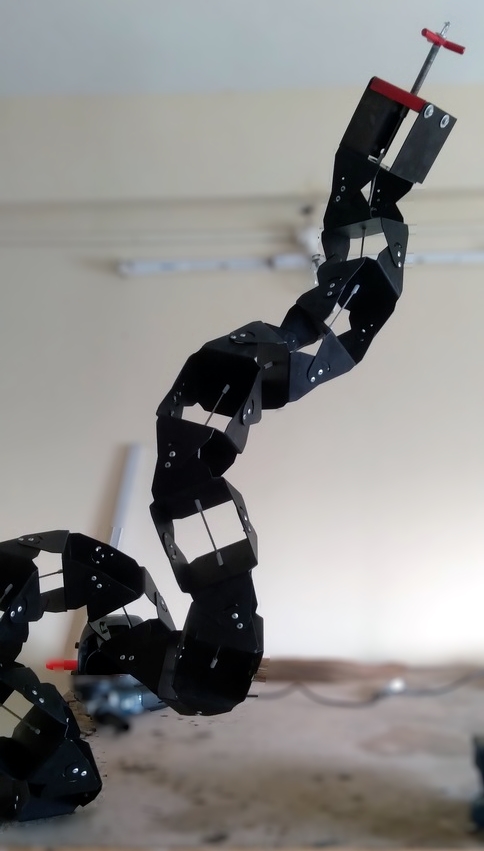
In aluminium 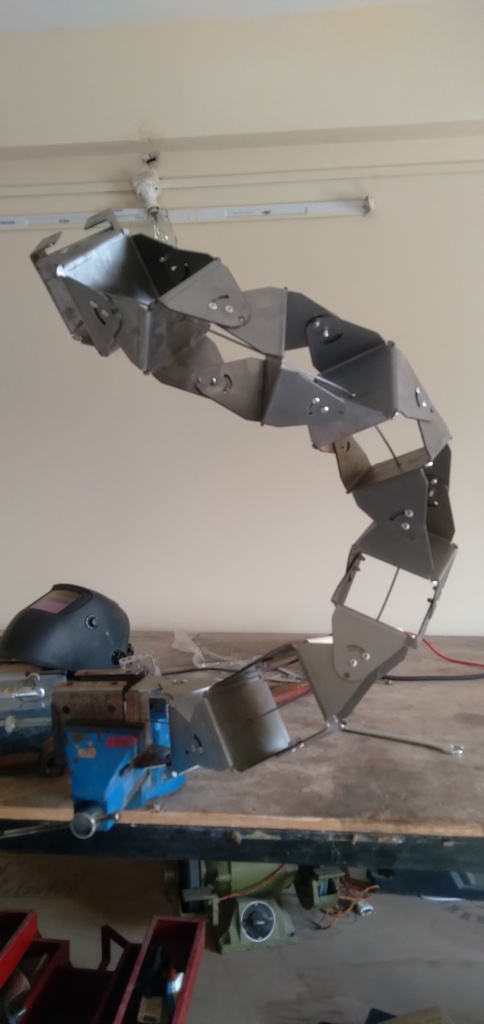
In MS. it is too heavy, but the concept works. 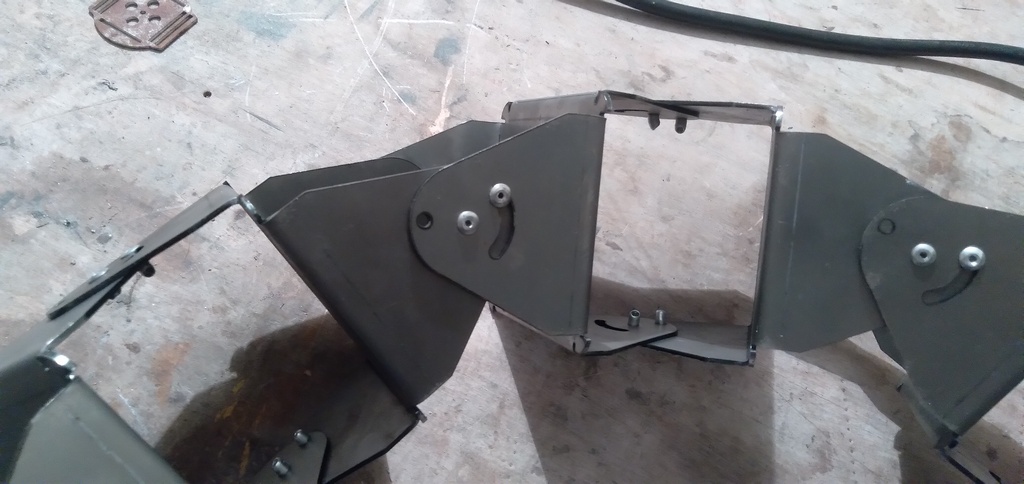
A blind rivet limits the 2 elements from going beyond the extreme positions 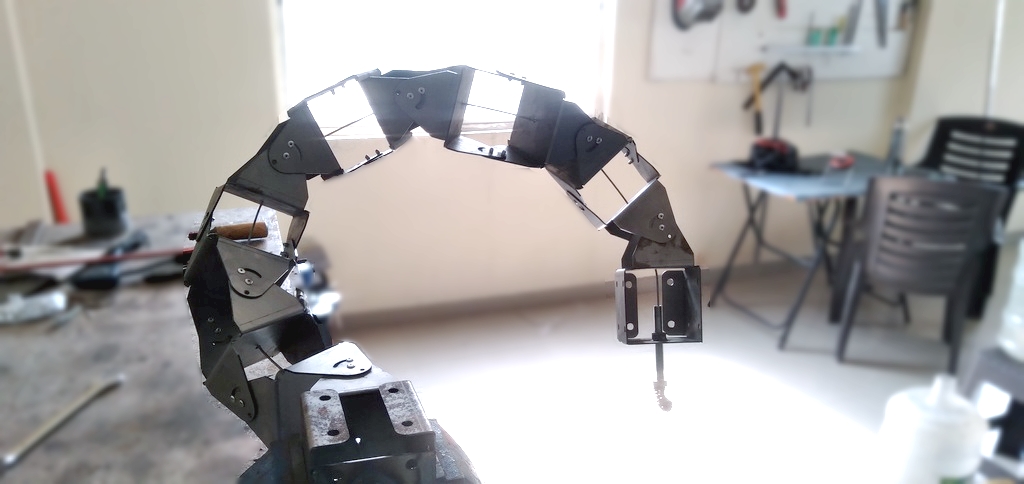
Some shapes… 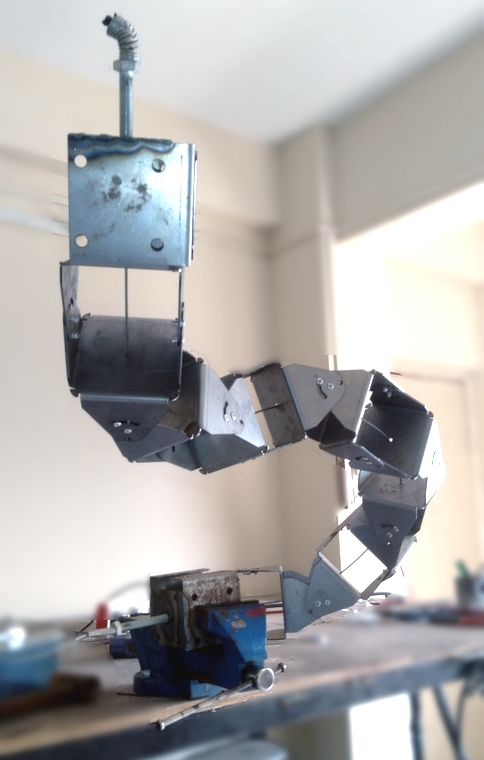
Same piece, but locked in a different shape. 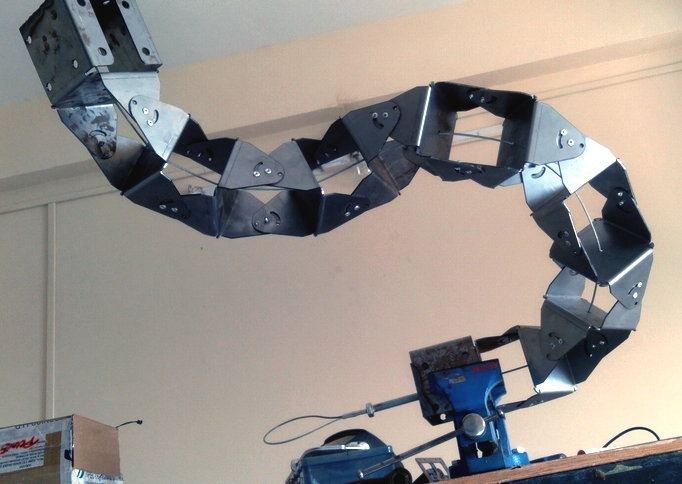
Another shape.
These worked, but then they didn’t. Here are the challenges:
- The joints broke with the tension and weight. Learning – don’t use pop rivets for joints!!!!
- Aluminium is better than MS, because it makes the structure so much lighter. However welding in aluminium is not easy.
- The joints and structure flexes quite a bit, and so it does not maintain shape under the tensioning system. The whole point is lost if you tension the steel cable but then the elements flex it out. No wonder it could not hold its own weight.
So, after a long gap of thought paralysis (1 year) I reattempted what i call the 16th Prototype. It is made out of cylinders, rather than sheet metal. Here’s why:
- Cyclinders look nicer than industrial looking sheet metal works. Note that this is an important feature if it has to be used as a home furniture!
- Cylinders are available, and common. One does not need to resort to laser cut pieces and machinery in this way, thus making the design more accessible as an open-source design.
A technique of bistable elements mechanism was invented using cylinders and regular fabrication workshop. Illustrated here.
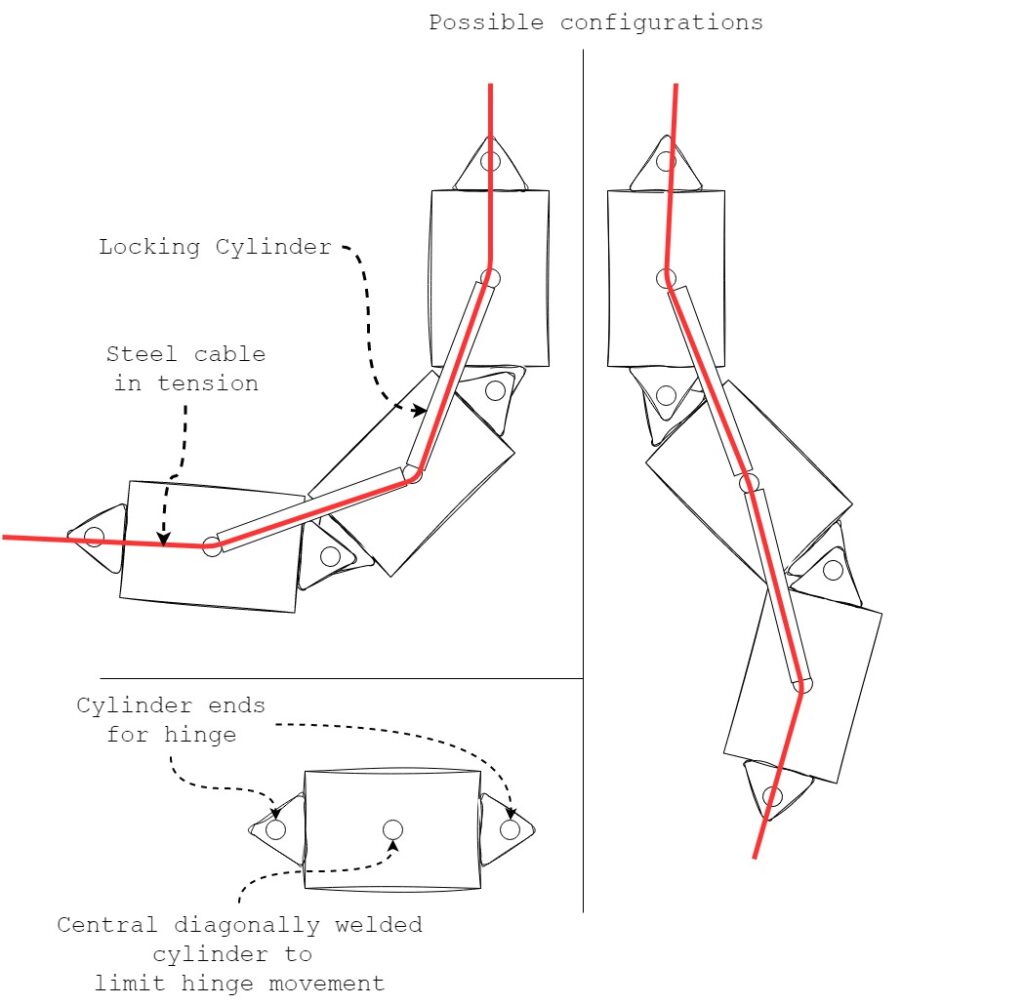
Each bistable section has 4 features:
- 2 main cylinders,
- A hinge comprising of extended edges of the 2 main cyclinder. Note that there is no pin passing through to the other side, so central portion of the hinge piece is free.
- Another cylinder of small diameter diagonally welded into the main cyclinders. There is also a hole at the center of the cylinder’s length through which the steel cable passes.
- A 4th cylinder through which the steel cable passes and which limits the bistable system in either extremes of the movement.
Here is how it looks after assembly:
Failures
- Each main cylinder has 2 different axes for the hinges at both the ends. This allows for the stand to take on any shape in 3D. However, this makes it difficult for the central locking cylinder to lock on to the diametrically welded inner cylinder.
- The length of the inner cable guide and locking cylinder was not accurate, hence the locking was not happening.
- The tightening system needs to be worked with. It was too hard to tension the system.
Adversity as a basis for education
Resourcefulness and self-drive against adversity are 2 key parameters for one to act as an innovator. Common examples could be mothers who are resource constrained in terms of energy, time, money, facilities, and so on, but the love and desire to take care of the family surmounts these challenges. The outcome is an innovative environment that is dynamic and evolving. A similar but rarer example is that of jugaad or bricolage or resourceful engineering, practiced by certain people who are desperate to attain a certain goal but don’t have the conventional resources to do so. The antithesis of this is the comfortable life, devoid of resource challenges and adversities, and hence devoid of opportunities to grow resourcefulness against adversity. Why is this peculiar character important? Does this have a role in the education of a young mind? How is this relevant to life in general?
The strive for a comfortable life is the norm in today’s India. Everyone wishes this for themselves and their loved ones. We want to get into good educational institutions, get good degrees, make good money, and eventually have a good settled comfortable life abundant in material resources and comfort. That is the dream. No one likes discomfort, we hold such innate disgust for discomfort that we wish to remove it from our lives altogether. A person experiencing discomfort is looked down upon someone who either needs help, or pity, or worse it is seen as a punishment for wrongdoings of the past or karma! Most of our culture is focused on helping people in discomfort to transform their environment into bodily and mental comfort, be it the role of technologists or psychiatrists. People who face discomfort on a regular basis are considered as losers, failures, intellectually challenged, less privileged, lower in social strata of all kinds, and so on. Our educational systems and culture focuses on intellectual growth without bodily or mental discomfort in the process. Kids are raised so that they don’t experience discomfort and could rather focus on ‘better’ things.
As we all grow in the overwhelming culture of anti-adversity, are we loosing something crucial here? In this culture, prevalent in the middle class and above, we train ourselves to run away from adversity, to demean it. And in this process we lose the skills needed to engage meaningfully with adversity. Why is this important? For one, life is not so comfy, ask anyone who has lived more than 20-30 years. Adversity is the big big elephant in the small room. Yes, technology helps in a great way cutting out nature’s adversity as well as people’s adversity from our cocooned lives, but nature, people and personal health issues sneak in anyways. Despite the medicines, despite the latest gadgets, we are faced with emotional, mental, physical degeneration and ultimately death. If adversity is the norm, then why aren’t we talking about healthy engagement with it? Why do we always have to bring in a technological, or cultural barrier in between, only to postpone the facing of adversity? Why are we fooling the kids in the name of education?
Our education institutions have become hotbeds of mollycoddling and spoon feeding sub-standard content to uninterested minds. Trust me, I realize I have also been doing that! It’s only when one steps outside and asks the simple fundamental question – what is the actual relevance of education to the life of a student placed in a very localized context? If the only answer is get jobs and do survival business with no relevance to the content of the years of education, then that is a pathetically shameful answer. Every teacher may consider this as a reflection of one’s work. Heck, I didn’t and now I am in considerable pain as to what is education if not helping a kid towards becoming an autonomous, self-driven, adversity tolerant and sensitive human being. And mind you, no amount of simulation of adversities can replace facing real adversity, real challenges. The good thing is life is full of it, only if you can remove comfort from education, a little bit.
Teaching – a tough personal experience
I have been a teacher on and off for over the past few years. I have taught about making devices/instruments, some maths and some physics to undergrads at a local elite college in Pune. I have had a mixed experience if I reflect back. The last year was particularly intense and tough on me, and so I have decided to quit formal teaching, at least for a year.
Being a normally driven person with some excitement in what I do, I tend to get carried away expecting the same from others. This was evident in some projects I had given and mentored with kids. Everything started nicely, and the kids responded well. These kids weren’t from the engineering or the sciences base, but studied a mix of various subjects from humanities and some science and mathematics. They loved the initial joy of making gadgets and were quite enthusiastic to make new things and imagine new things to be made. We learnt some electronics, soldering, 3d printing, design tools, etc. After learning some basic skills they were tasked to practice those skills in making projects, from a list of projects I needed help in. Although the projects started well, I realized the kids loosing steam half way through. Except a few, most failed to push enough and complete the individual targets set for their particular projects. They weren’t also coming back to me with their issues or discussing among themselves, I felt. As a teacher passionate about the projects and this whole act of making things by hand, I was disturbed. Even after repeated coaxing, the apathy of some of the teams was evident. And my annoyance in this lack of effort or sincerity probably became more and more evident. One of the students even complained that she could not communicate her challenges with me, or do the work assigned to her for her own exams, because I was “rude” apparently. By the end of the course, only a small group actually completed their projects, the rest completed the formalities of the course.
Another example was from teaching maths and physics. Most students showed interest and participated in the class with great amount of passion. I think I fared better in these classes as a teacher than in the maker classes. In another course where I was to co-teach research methods, I realized the similar trends – loss of interest by students as the work got harder. While these phenomena were on going, where students at one point may find traction in the course, while on the other side of the calendar loose interest, I realized I as a teacher also converted from a hopeful and compassionate human at the beginning of the calendar to a hard task master at the end of the course. While this is not black and white, it seemed so one of the perspectives shared by my colleagues. What was evident were the hard comments I was giving back on submissions by students, calling out callousness and shoddy work, calling out blatant plagiarism, abuse of technological privileges such as AI tools. My hard comments disturbed the kids, and the concerned authorities/teachers/admins. The sad part was that I was not so aware of this until it was brought to my notice by my colleagues.
When I re-read my own written comments, I realized that they were mean. I was shocked myself, and felt embarrassed. Some of my words could be interpreted as severe and not acknowledging the person’s struggle or the overall context. I have struggled to understand these reactions of mine, often finding all the fault with me on one hand and repenting it. Sometimes I feel that I was too passionate about the subject and expected very highly of the students, which may have led me to be so harsh on their performance. As a teacher this has been the toughest of all experiences. I also feel I was under much stress of teaching. Facing a class full of judging youngsters, my personal anxiety of ‘performing’ as a knowledgeable guide while i struggled with the nuances of the topic, my lack of experience in the teaching the subjects and other reasons may have led to a built up of emotions, which manifested in my uncalled for expressions. The critical feedback I received from about a year of passionate effort from my end, came as a shock. It was disheartening to say the least. I am still processing the experiences and interpretations, not completely sure what went wrong, what was right, etc. The moral burden of being on the ‘wrong’ or unkind to people, especially kids is crushing. But I learnt a lot I would say, and I am still discovering layers and layers within this rich experience. I loved many moments of the teaching experience, and especially the joy of connecting with kids via the topic on hand, mutually participating in the wonders of the subject, and so on. It gives me hope that I was not too bad a teacher or a human, most of the time.
On our belief in science!
Truth is a hard game. Its hard to get to do experiments which will be good enough to verify and test the existence of truth. Of the impossibly long list of things to be verified in our lives as human beings, material world questions sometimes could be relatively simple as compared to the remaining. How far does a ball fall when thrown at a certain direction, is a well known example. The thrown ball behaves very well as per our predictions. The more accurately one can set up the experiment, the more accurate the result gets with respect to our rather simplistic theories. In fact we have the uncommon benefit here that you can set up the experiment so very well (with simple precision tools and calibrated instruments) that the theory’s weaknesses are exposed (neglecting effects of air drag, for example). Yet, not all experiments in the material world are so easy to work with. Most of the science as we know it today, as practiced and taught, are not experiments which the students or teachers do for themselves, but as dogmatic beliefs.
Check this out, do you really by Newton’s laws? Most of us will say yes, but how many of us have actually checked it by experimenting themselves? So aren’t we just like mere believers in ‘myths’ of the day? The rationalists among us would argue, we can verify the laws if we want to, that the procedures for such have been available and kind of practiced in science class rooms over hundreds of years, etc etc. But please tell me the ratio of people believing in the validity of netwon’s laws vs. people having the luxury of testing it for themselves? Add to it the challenge that while Newton’s laws can be tested affordably, the 100s of other laws of the material world built on these fundamental laws have been popularly tested even by lesser and lesser of the people. Do you get my confusion?
Resources for experiments could still be arranged. But what to do about motivation? As a mere human, if some 10s of people of high repute or relative power as compared to me tell me if something is true, I will tend to believe it. It is not hard to convince me or anyone else for that matter, of strange and fascinating stories. Of course over the years, thanks to a healthy skepticism developed within me due to the active practice of indulging in healthy self-doubt, some stories are not convincing, but most others are, I shall admit. Let’s say the ideas of relativity. How much do I know about it? Well, I know some equations and some concepts within it. Have I verified it for myself? I guess there are only a handful of people in the world who have actually done any real experimentation to verify some aspects of it. But many millions of people will claim to have understood it. It makes a great story, with many trained pundits agreeing to it that its a great believable story. One may argue to the world’s end that the basic principles that relativity is based on are well proven and thus with logical construction one can rest one’s trust in it. Relativity does explain a lot about the universe we live in, they would argue. I agree with this part, except that I am not convinced that we have been actually testing the fundamental principles for ourselves, enough. Rationalists would argue that not everyone needs to test all theories, in fact science as an institution is known to practice high merit and an almost sadistic degree of self-checking of science laws within the community. I get the rationalist’s point, but I also wonder what is that percentage of science checkers Vs the population of people like us who couldn’t experiment for themselves? Its a very tiny fraction of the population I bet. A lot of the thoughts we share are some form of beliefs that we think are truths. If I do come across someone who has herself/himself done the experiments and checked out the fundamentals of a theory, I shall be very trustful and happy to place my (blind) faith in that person’s work and conviction about the theory. Even with the best of intentions, my contention is that, most of scientific knowledge spread in the world today is no different from myths and beliefs in the minds of the people. We may even begin to doubt as to how then one could define what is a verifiable truth?
There is a beautiful Hindi movie called ‘Aakhon Dekhi’. It brilliantly portrays the challenges of truth which a man struggles with. “I will only believe in what I see with my own eyes”, he decides. The transformative immediateness of this realization is worth a view. If only testing by bodily senses were assumed to be the sole method of truth, just as the original practitioners of the sciences prescribed, how would our world look like? Certainly not like the current world. In our classrooms we talk about syllabuses and experiments and theories and so on. We learn for many years in institutions, practicing the arts of keeping articulate and detailed theories in our brains, linked together with best in world stories and logical sequences. Believing in our teachers, who believe in their teachers, who believe in scholars and so on. We are so convinced of the validity of the stories, that we do not think we need to check them out ourselves. Where does this immense ability of believe come from? And if we are so damn obsessive believers, then why does science claim to not be based on beliefs?
To me realizing this shallowness in my very own knowledge helps me let go of the many inferiority complexes I have with my peers in the sciences who definitely are are far too intelligent, accomplished, knowledgeable and insightful in its subjects. However, I feel great awe and intimidation in front of those people who have spent immense amounts of time working around their 5 bodily senses to learn and practice a subject, such as farmers, artisans, teachers in the arts of teaching, technicians, etc. The humble plumbers, electricians, repair guy, home makers, mothers, etc would be in that list. If experiential truth could be measured, some of the world would be immensely poor, while some would be immensely rich. We may wonder if our current social system places a similar value to these different classes of people.
I believe that we have evolved as a species deeply embedded in the practice and perpetuation of beautiful myths. I am just paraphrasing Youval Harari’s ideas to some extent. We could not have survived if we were not believers in our core thoughts. I say so because it is hard to think otherwise. Not everyone can experiment and be crazy enough to spend immense amounts of resources into verifying or testing out one’s numerous beliefs. Look at the kind of money being spent into universities and research labs to figure out what goes on inside an atom, while most of us are happy to believe in the first story that comes out of these hallowed institutions of knowledge. Just as we would respond to priests or to people in authority. Beliefs are probably the most efficient method for information to exist and survive in a dynamic mortal world. The oldest stories which have lasted to our age are powerful examples of beliefs and practices that have worked and held tribes, communities, and people together (at the cost of those who believed in contemporary counter stories). I imagine belief and trust as being core to the social glue that bonds and helps make our groups as super-organizations. Read ‘social organisms’, the idea that we are mere working slaves and carriers of truely living mega ideas, which reside in our minds, and control us in so many ways.
Rationality and science are modern words. The practice of such is intended to discover for ourselves, with our own 5 senses, or at least with our own realization of strong ideas and stories. But the practice of rationality and science is costly, and not the privilege of those with an empty stomach. Only some people can do the experiment, others can only follow the elite practioners of the elite arts of the sciences. This is the same reason that rationality does not sell well. The precautions needed to stem out COVID weren’t taken seriously and rationally till it became a scary thing. And even after the scare and the fears of COVID, rationality was not a common theme in the lives and practices of the billions of the earth with respect to COVID. We are ‘fashionable’ minds, and we follow what our peers do. We mimic like crazy, not even realizing we imitate so genuinely. We believe in blending in the crowd, via beliefs in shared common stories. Stories are our bonds. Rationally asks us to separate from the crowd of peers, a task that involves immense personal risks, unpleasantness and fear, and worse, the risk of painful social exclusion.
Is there a way to make more sense of this world, for those of us with lesser privileges? A basic sense of rationality is essential, but may not affordable. Can we yet value our myths loving brain, as not necessarily being a bad thing? Can we stop judging people who may not feel very rational? Can we accept irrationality as a very genuine expression of who we are?
Stuck – an ordinary innovator’s song
Days go by and nothing moves
you fumble, stumble and try (again)
ideas are stuck
projects are stuck
head bangs against a wall
of unknowns
no one knows
no one can help
there are no experts
no one’s around you but you
and the unknown, uncharted.
No social life
nothing to talk about
they wont get it you say
nothing to show that is credible
understandable, comprehensible
or beautiful to the common eye
Except perhaps an old story
of a crazy innovator’s mess.
Why bother so much? they ask
move on, life can be predictable!
Ya, right!
Why bother? Who cares?
One is tempted, every moment.
To let go. To chase the next greens
To play.
Escape seems possible and beautiful.
But something keeps alive
the silly bug of a stuck innovator.
The charm of unconnected pieces
materials and parts needing nurturing and attention
mysterious ideas needing form
dreams
stories materials wrote on the bruised hands
a nose smothered with solder smoke
and burnt metal in the taste
eyes sore with tiredness and despair
a pocket full of holes
debts to others
sweat of many moments past
an identity looking for a home
freedom
credibility
self-esteem
all waiting in line
for the stars to align
and a universe
to fall in place.
Another example of a on-bed laptop stand
My fear of math

I wasn’t great in maths during my institutional education period. I never connected with maths, until I started realizing it as a useful tool during my doctoral research work. But still the connection was weak, I did only that amount of work on math as much was absolutely necessary. I used numerical methods because it was a tool that helped me process my experimental test bench data during my PhD. I had no attachment to the tool. I experienced fear.
Fast forward to today. I am a part-time math teacher and hoping I am not too bad at it (fingers crossed). I am hoping I also improve my skills. But the pertaining challenge is – I am afraid of maths. In the introductory class on calculus which I am teaching to undergrads, we talked a bit about the experience of math with the students. And almost everyone expressed their fear of maths. And as i realize more and more, almost everyone around says they fear math. Many have expressed that they didn’t take up studying sciences because of the requirement of maths to be studied along with. In a course on ecology in which I am participating as a student, whenever the teacher throws in some mathematical formulations, I can sense my fellow participants taking a back step, or looking at each other with sad eyes and pathological fear. I would have done that too, had I not had some confidence built up in math over the years. Before every math class I go to teach, I experience many hours of anxiety and self-doubt. I prepare my lecture fighting the thought – “Oh shit, I don’t know if I know this shit myself, what will I even explain to my students?”. I fear my students might see through this fear and judge me, or feel similar, and actually suffer, partly due to their own fears of the subject and partly due to a teacher who himself fears the subject. Imagine a classroom full of fear and anxiety, and if this ever happens, how can learning exist in such a situation, ever? So my question is, why this fear of math? I wonder how many of our teachers of math are also suffering from this alleged fear? How many students would have dropped engaging with mathematics altogether over such a traumatic fear of numbers and functions and relationships?
If this fear were true across the world, I am sure it must have been addressed and studied before? Yes. There is a nice Wikipedia article titled ‘Mathematical anxiety‘. It talks about this distress and how it affects performance of children and how people have tried to tackle it, contain it by improving the pedagogy. It talks of how it was measured and found to be a significant problem. I am sure following the links and papers mentioned in this Wiki article and elsewhere, one can come up with a more thorough and through understanding of the issue. But let me take a step aside from all the academically sound and proven literature about it, and instead express some of my naive thoughts on this issues.
2 thoughts. The first one being the nature of math seems to be quite different from the natural working of our brains. and secondly, math anxiety may be related to our deeply ingrained lasting fear of exclusion from our social group.
Relationships – our core nature
To discuss the first point, imagine a subject which triggers emotions and sensations within us. Examples could be literature, films, music, dialogs between people or living beings or with inanimate things. Math is not such a subject, normally. To realize such levels of emotional or sensory upsurge while dealing with math is a gift of the very few, who are able to associate sensibilities to mathematical forms. It is at beast an acquired taste. Paul Dirac, if I remember from my physics courses, could and wished for such a deep connection. Checkout “Mathematical Beauty” – an article talking about the aesthetics of mathematical formulae and Dirac’s idea that a physical hypothesis is true if its mathematics is beautiful. However valid such associations may be, it may not be accessible to the most of us. The super abstract nature of mathematics requires significant amounts of dedication, focused and single minded mastery of the subject before aesthetic senses (may) kick in. Such is true for any subject, be it physics, carpentry, literature, or any other. However, it seems the ability to sustain the abstract quest, in order to secure some mastery, but without the aid of emotional or sensory feedback is the key difference in what separates math from other subjects. It is obvious that every subject requires some set of elementary skills so as to connect and engage with. And acquiring these skills takes much time and effort. For math, it seems it takes significantly more time and effort and a certain non-dependence on immediate emotional and sensory returns.
Coming back to our initial experience with mathematics, a lot of people seem to ask the question – why? Why learn surds, complex numbers, algebra, trigonometry and so on? How does this knowledge help me with my current problems and desires, which mostly deal with my abilities/challenges to connect with the world around me? How does math help in me relating to my needs? Answering such questions could probably help build trust and buy some time to help keep a student’s openness to the math. But if we may enquire further, why do we have such a significant desire of dealing with the world via connections in the first place? I know it sounds like a stupid question, but quite revealing for me! I think due to our evolution as physically weak creatures, our social structure and inclusion with our peers seems to be the most fundamental medium to survive. Groups survive better than an individual. We may be intrinsically programmed to have this fear, without conscious thought, so that our body/mind automatically seeks inclusion by approval and valuation from our peers. The deepest insecurity in ourselves is thus the chance that we might be rejected from a group on some mysterious grounds. We also project relationships with non-human beings as well as objects (Gollum’s “My Prescious” could be a reference). Thus, it seems the humanities could be the subjects which deal most directly with our very core human nature, or this obsession with rejection/devaluation of any sort. However, it is unfortunate why humanities is not the dominant popular subject in the modern human world. I wonder why?
Abstraction – the killer idea
When we began to find and develop tools, we also naturally associated relationships with those tools. We do it even now, I think, all the time! My car, my home, my keys, my computer, my cellphone, etc. However, when our ancestors began making more sophisticated tools from rocks and wood and fire, they probably realized, as we do now, emotional attachments are not helping in making better tools. The quest for a better tool essentially requires a letting go of formed relationships, even if they are powerful and deeply of value. Modern science has taken this ‘abstraction’ to a new high. We have realized our tools to be distant unnamed servants, not friends. Well, for most of the tools. But we still do have our cars and homes and gadgets with overriding ‘relational’ and emotional value to us, even if they don’t serve the utilitarian purposes they once did or promised. The abstraction abilities help us extract simpler utilitarian relationships between objects which have non-human tendencies. Like in physics, if an apple falls from the sky, its not my apple which fell from the sky as ‘gods’ would have wished for, it is a phenomenon that seems to occur millions and millions of times every day, irrespective of who observes it or triggers it. Such an act of removing the human being from the scene has helped blast out the powers of scientific thought from the confines of human emotional/relational chains. We now do a lot of science where a significant amount of time is invested to remove the artifacts of the experimenter or the biases of the theorist from the work. When we do a survey we try to remove the biases of the surveyor’s nature and character from the work, so that it may be replicated across the world. Even in the humanities this phenomenon can be observed, for example in the modern method of historiography where historians study multiple accounts of the same era/events to remove the biases of the individual history chroniclers, thus leading to a more ‘factual’ understanding of the world. Replication, yes that’s the amazing power of abstraction. Once a complex situation is simplified enough by abstraction, a simple model of the phenomenon is formed, which is called a pattern. The idea of this pattern is perfected, and now such patterns in nature could be observed, and predicted. We can also modify some key parameters to influence the very nature of the pattern and as a consequence form newer patterns!
The language of abstraction is math. Math has become the most powerful tool in the hands of scientists, economists, planners, industries, etc. Expressing things in mathematical form is the basis of our industrial world today, of human behavior today. Money is directly math, and it matters like blood would to a body. Math is just everywhere and directly linked to survival, even if most of us would not like to practice math. The outcomes of math are too utilitarian and loud than its intrinsic aesthetic value and beauty. The tool has become the tool of the masters, but it also has a heart and beauty which is drowned by the pressure to learn and use the tools in this practical world. What we teach in school about math seems to give out a confused message to the kids, are we teaching math as a tool of survival or are we teaching how to appreciate the beauty of abstraction? In fact what is education by itself, should be reconsidered deeply. Is it a tool to learn about and value life and relationships around us or is it so that we serve as mere pawns in the practical world of large organizations (including the idea of nations)?
Not being able to abstract well is now judged as not being intelligent, or versatile. The central theme of school and education and social life is – Are you intelligent enough that one must include you in the group? We fear this and everyone knows, but no one acknowledges. Isn’t it an irony that while we humans dominate the world in numbers and we have more peers around us than ever, and yet we feel so scared of rejection? And ‘intelligence’ has been narrowed down to the ability to live and talk and walk in this artificial disabled state of abstraction, unconnected to the people and places around us, unconnected to the self that is full of relationship seeking and sensory activities. It seems to me that abstraction, despite its value in increasing the scales of human collaboration and civilization, it kills the need for a heart and the need to form emotional connects. Therefore, I believe that such a habit of unchecked abstraction may also be responsible for deteriorating the planet, while allowing a fraction of the human population to experience the adrenaline rush which comes from technology driven change.
Conclusion
Given these challenges, naturally why should one participate in a subject that is so removed from reality, and within which so easy to be judged as inadequate? Why risk social connections and value when it is already too much to handle anyways? Some people don’t mind being a recluse or away from the mainstream, for various reasons. We are called ‘nerds’. We like to spend more time with non-human subjects than in the overwhelming world of relationships, which feels like an alien planet altogether. An interesting example is Sheldon from the Big Bang Theory. It wont be too wrong if I say the modern world of science and technology has been designed and built by nerds, and thus is the modern meaning of intelligence fashioned upon qualities that promote abstract thinking. The destruction and inhuman nature of the world is also in front of us, probably brought to us by the same disconnected thinking that we consider as intelligence today.
Given this realization, I wish to convey to myself and my students that its OK to not ‘get’ math. It’s a great subject, and one can love it and see through it a glimpse of the vast universe, and even dare to comprehend an infinitesimally small fraction of it. But to not get it in everyday of our lives is perfectly alright. Some people connect to the world better in abstract forms, whereas some need relational, emotional and sensory connect. The common truth is – we all hold the same desire of connecting, just the paths may be different. The math and physics and the sciences are just one of the many ways to connect to this mystery that we call the universe. If we are unburdened about paths in general, then maybe we will be kinder to those who travel different paths.
Mask Testing Device V0.3
V0.1 and V0.2


